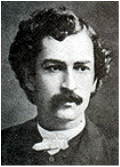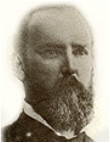Our History
Trinity's Story

It’s been said that as America moved west, the Episcopalians came along—when they could get a Pullman reservation.
This was almost literally true of Trinity in its early years: Many of Trinity’s early leaders found themselves in Huntington because of the railroad.
Trinity—the first Episcopal Church built in Cabell County—began in 1869 as a small mission in Barboursville, W.Va. Several years later, in 1872, the mission moved to Huntington, and began holding services on the second floor of a building on the site now occupied by the Radisson Hotel. The mission also adopted a new name: Trinity Episcopal Church.
The Church’s early growth coincided with the development of the city of Huntington in the 1870’s as the western terminus of the expanding Chesapeake and Ohio Railway Co. Thriving on its post-Civil War ties with C & O, Huntington welcomed Trinity.
The Church returned the favor. Trinity’s membership was made up mostly of Huntington’s movers and shakers—families whose prosperity was rooted in post-Civil War boom times and the gas, coal, steel, and railroad industries that fueled them.
With its members’ wealth and prestige, Trinity quickly became a forceful presence in town.
The first clergy to take charge of Trinity was the Rev. E. Valentine Jones who was sent for that purpose by the Bishop of Virginia because Huntington was a part of his diocese until the establishment of the separate Diocese of West Virginia.

The first priest assigned to Trinity after West Virginia became a separate diocese was the Rev. John W. Lea,. He was placed in charge in 1878 by Bishop George W. Peterkin, the first Bishop of West Virginia in the Episcopal Church in the United States. During Mr. Lea’s tenure the present church building was constructed. After Mr. Lea, Trinity had a number of rectors and went through a series of challenges and achievements as it eventually became established as one of the leading parishes in the Diocese.
Since 1916 Trinity has had only six rectors. Two of them went on to become bishops, and three of the others were seriously considered as nominees.
